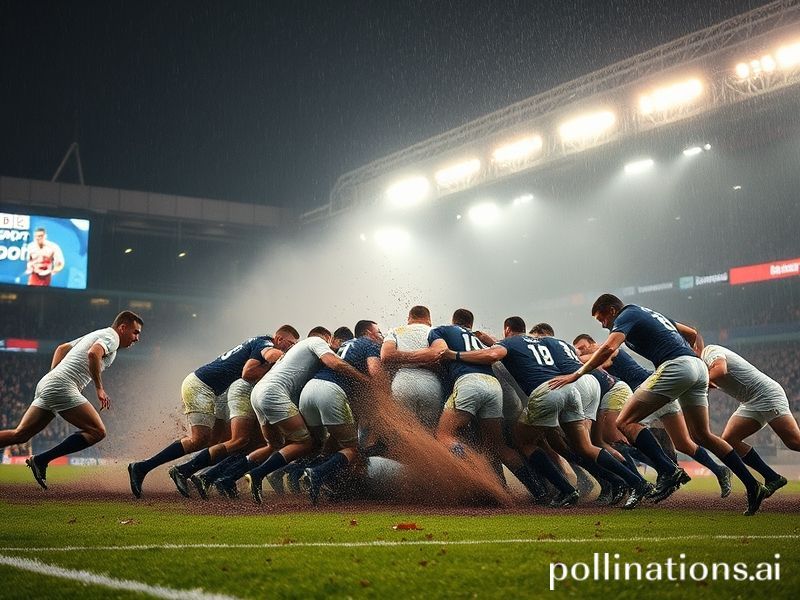BBC Rugby: The Last Genteel Crusade—How a British Broadcast Becomes Global Ritual
The BBC’s rugby coverage usually opens with a brassy fanfare and a slow-motion montage of glistening foreheads, but zoom out a few thousand miles and the same footage looks less like sport and more like a ritual re-enactment of Empire—performed, naturally, in four languages and beamed to 180 territories where nobody has ever knowingly scrummed. From a bar in Buenos Aires where the commentary is dubbed by a chain-smoking ex-pat, to a Nairobi living room where the feed keeps cutting to ads for mobile-money loans, the BBC’s rugby output is Britain’s last globally respected soft-power export whose collateral damage is only mild concussion.
International audiences don’t tune in for the rucks; they come for the etiquette lesson. Watch the crowd at Twickenham politely applaud an opposing kicker while global inflation eats their savings—there’s a masterclass in repression you can’t get from TikTok. The Corporation obliges by packaging the game as a nostalgic safe space: all velvet tones, aerial shots of damp meadows, and cutaways to Prince William pretending he doesn’t know the offside rule. To a viewer in Jakarta wondering whether the rupiah will survive the week, the spectacle offers a reassuring fantasy that somewhere people still worry about line-outs rather than food queues.
Yet the BBC’s rugby empire is shrinking faster than a rugby prop’s waistline after retirement. France’s Canal+ has lured the Six Nations away with a cheque so large it could prop up a minor currency. Sky, Amazon, and even Stan in Australia are slicing off premium rights like flankers pilfering ball at the breakdown. Auntie responds with her usual stiff-upper-lip statement about “serving licence-fee payers,” a phrase that translates roughly to: “We’ll show highlights on the website, sandwiched between a baking tutorial and a documentary on otters.”
The global south watches this scramble with the detached amusement of a front-row forward observing a backs’ fashion crisis. Fiji, Samoa, and Tonga supply the bone-jarring tackles that make every World Cup highlight reel, but their home audiences still stream matches on glitchy Facebook feeds because the BBC’s geoblocking is more ruthless than an All Blacks counter-attack. Rugby’s governing bodies wring their hands about “growing the game,” then hand the broadcast rights to whoever pays most, ensuring that the sport remains a boutique pastime in places where football costs nothing but a punctured plastic bottle.
Meanwhile, geopolitics sneaks onto the pitch in studs-up fashion. When the Springboks line up against England, South African expats in Dubai see a morality play about colonial invoices finally being stamped “paid.” When Japan’s Brave Blossoms upset Ireland, the BBC cuts to a Tokyo fan in a plastic samurai helmet, because nothing says post-industrial harmony like commodifying centuries of martial tradition into a prop that wilts in the humidity. And when the All Blacks perform the haka, commentators wax lyrical about “ancestral pride,” conveniently skipping the part where the same network once bleeped out Māori lyrics for being “too aggressive” for breakfast television.
The cruel irony is that rugby’s most compelling narratives—the Pacific Island boys traded like human derivatives by European clubs, the Welsh villages whose only pub shuts when the team’s on the road, the CTE lawsuits queuing up like line-breaks—are precisely what the BBC’s polished coverage is designed to blur into soft-focus montage. Viewers abroad sense the violence beneath the velvet, which is why they keep watching: it’s comforting to know that somewhere else is still willing to ritualise pain into something that looks, at least for eighty minutes, like order.
As another autumn international looms, the BBC will cue the trumpets, the royal box will nod approvingly, and somewhere in Suva a teenager will illegally stream the match at 3 a.m., dreaming of a contract with Leicester while his mother calculates whether to pay for Wi-Fi or rice. The signal crackles, the scrum collapses, and the world keeps turning—just slowly enough for a cynical hack to note that the only thing more predictable than a box-kick is humanity’s talent for dressing up empire as entertainment.







